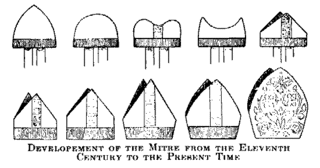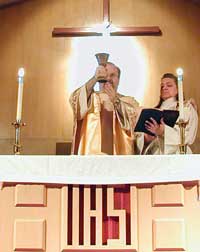A bishop is an ordained, consecrated, or appointed member of the Christian clergy who is generally entrusted with a position of authority and oversight.

An episcopal polity is a hierarchical form of church governance in which the chief local authorities are called bishops. It is the structure used by many of the major Christian Churches and denominations, such as the Catholic, Eastern Orthodox, Oriental Orthodox, Church of the East, Anglican, and Lutheran churches or denominations, and other churches founded independently from these lineages.
The United Methodist Church (UMC) is a worldwide mainline Protestant denomination based in the United States, and a major part of Methodism. In the 19th century, its main predecessor, the Methodist Episcopal Church, was a leader in evangelicalism. The present denomination was founded in 1968 in Dallas, Texas, by union of the Methodist Church and the Evangelical United Brethren Church. The UMC traces its roots back to the revival movement of John and Charles Wesley in England, as well as the Great Awakening in the United States. As such, the church's theological orientation is decidedly Wesleyan. It embraces liturgical worship, holiness, and evangelical elements.

An episcopal see is, in the usual meaning of the phrase, the area of a bishop's ecclesiastical jurisdiction.
A bishop is a senior role in many Methodist denominations that have an episcopal polity.
David Jerald Lawson was an American who gained notability as a pastor and university campus minister in the Methodist and United Methodist churches, as a district superintendent, annual conference official, and as a bishop of the United Methodist Church (UMC), elected in 1984. He also played a key role establishing and developing Africa University, which is the only UMC university on the continent.

Robert Tsugio Hoshibata is a Bishop of The United Methodist Church (UMC), the second-largest Protestant denomination in the United States. He was elected to the episcopacy in 2004. His first assignment was as Bishop of the Oregon-Idaho Conference of the UMC. He currently serves as Bishop of the Phoenix Episcopal Area, Desert Southwest Conference for the UMC.
Larry Martin Goodpaster is a Bishop of the United Methodist Church, elected in 2000.
Robert Eric Hayes Jr. is an American bishop of the United Methodist Church (U.M.C.), currently serving in the Oklahoma Annual Conference. Before being elected to the episcopacy in 2004, Hayes served as treasurer of the Texas Annual Conference. He has served as a pastor, district superintendent, and college chaplain.

An annual conference in Methodism is a regional body that governs much of the life of the "connectional church". Annual conferences are composed primarily of the clergy members and a lay member or members from each charge. Each conference is a geographical division. In general, the smaller states in the United States hold one conference each, while larger states often include two or more conferences. Several annual conferences are held in other nations as well.
Daniel Wandabula is a bishop of the United Methodist Church, elected in 2006. At the time of his election he was forty-one years old, one of the youngest bishops of his denomination.

The General Conference, in many Methodist denominations, is the denomination's top legislative body for all matters.

An elder, in many Methodist Churches, is ordained minister that has the responsibilities to preach and teach, preside at the celebration of the sacraments, administer the Church through pastoral guidance, and lead the congregations under their care in service ministry to the world.
An episcopal area in the United Methodist Church (UMC) is a basic unit of this denomination. It is a region presided over by a resident bishop that is similar to a diocese in other Christian denominations. Each annual conference in the UMC is within a single episcopal area; some episcopal areas include more than one annual conference. Episcopal areas are found in the United States as well as internationally. In some cases, such as the Western Jurisdiction of the US as well as some places internationally, an episcopal area covers a very large territory.

Methodist viewpoints concerning homosexuality are diverse because there is no one denomination which represents all Methodists. The World Methodist Council, which represents most Methodist denominations, has no official statements regarding sexuality. British Methodism holds a variety of views, and permits ministers to bless same-gender marriages. American Methodism concentrates on the position that the same-sex relations are incompatible with "Christian teaching", but extends ministry to persons of a homosexual orientation, holding that all individuals are of sacred worth. The following denominations are members of the World Methodist Council.
The United Methodist Council of Bishops is the organization of which all active and retired Bishops in the United Methodist Connection are members. In the United Methodist system of polity, the Council of Bishops is the Executive Branch of United Methodist Church government.

The North Texas Conference is an Annual Conference. This conference encompasses a triangle-shaped northern portion of the state of Texas that spans from Dallas to Wichita Falls to Paris. The conference includes a small geographic area relative to most annual conferences. The North Texas Conference comprises 301 churches, 141,827 members, 4 districts and 20 counties.
B. Michael Watson is a bishop of The United Methodist Church, elected in 2000. He served as resident bishop of the North Georgia Annual Conference, which comprises 1,000 churches, more than 1,500 clergy members, and more than 320,000 lay members. He retired in 2016 and currently serves as ecumenical officer of the Council of Bishops.
Grant J. Hagiya is a Bishop in the United Methodist Church, having been elected to that position in 2008.
Rev. Dr. Sally Dyck is an active bishop in the United Methodist Church, the second largest Protestant denomination in the United States. In 2021, she will begin serving as the Ecumenical Officer of the Council of Bishops of the United Methodist Church.




